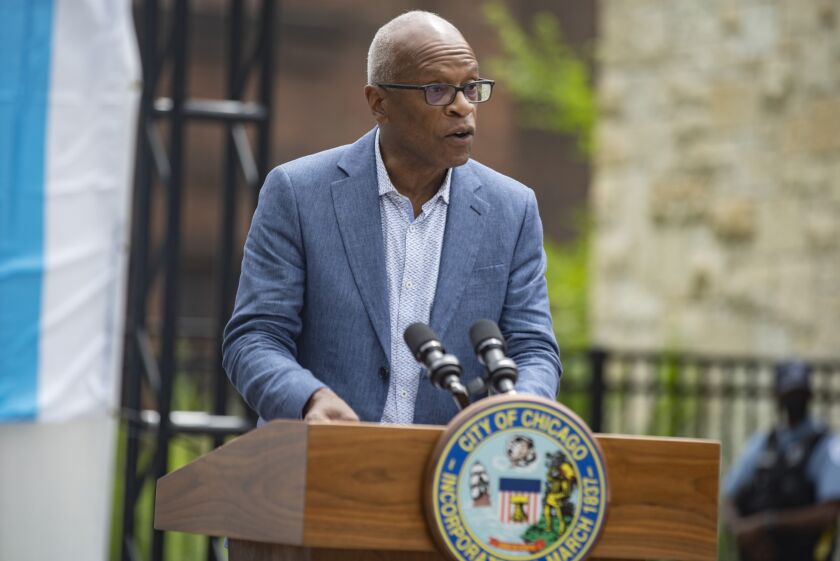Somebody in this town has to put in a good word for Soldier Field. Not for its architecture, of course, nor its suitability for today’s National Football League, nor its fan experience, but about its prospects to remain the home of the Chicago Bears.
Some think that because the Bears have a contract to buy the Arlington International Racecourse site, they are definitely going there. Hardly.
So here goes.
Soldier Field remains the logical and the best place for the Bears to play. Compared with the cost of building in Arlington Heights or anywhere else, the team could spend less to get a reconfigured stadium where one already exists.
It’s in downtown Chicago, which is capable of generating more public money to support the project, mostly in the form of hotel taxes, than a suburban site could muster. It already has access for cars and public transit.
Arlington Heights might work only as part of a massive, speculative real estate venture that could fail or take years to pay off.
Anything could happen. The Bears might still leave, especially if the McCaskeys were to cede control of the franchise to richer people with a greater appetite for risk. But I came around to appreciating the chances the Bears would stay put after a couple of interviews last week.
One was with Maurice Cox, Chicago’s commissioner of planning and development. His agency has the data and the development expertise to advise Mayor Lori Lightfoot on this matter. My exchange with Cox went like this:
Q: Is the mayor involving you in discussions over a Bears stadium?
A: Oh yeah. … Everyone is interested in keeping them here, and everyone is interested in making a state-of-the-art facility. The potential is right there for us. I’m just looking forward to keeping this conversation going.
Q: Are you offering the Bears [alternative] sites?
A: No, no, we’re not able to talk about that. You know, we have an amazing facility at Soldier Field, and I think we would be remiss not to stay focused on it.
Q: The engineers say it would be pretty hard to do something at Soldier Field [like adding a roof] …
A: Show me the studies that say it can’t be done. There is a whole history of retrofitting historic stadiums to get the size, to get the coverage, so I wouldn’t give up so quickly on Soldier Field.
Q: Is there a price tag that has been offered up?
A: I just wouldn’t give up on Soldier Field. So, I think we’re going to do everything we can, and so I’m looking forward to continuing the conversation with them.
Q: Has your department compiled a list of other sites in the city that could interest the Bears?
A: I’m not willing to give up on Soldier Field. I’ll leave it at that.
Having had the commissioner quash my notion that the city might steer the Bears away from Soldier Field, I sought out a real estate pro with city and suburban experience who knows the ins and outs of “entitlements,” the legal authority governments grant for the right to build something.
This person, a Bears fan, didn’t want his name used to protect business ties. He was just as adamant about Soldier Field as Cox was.
“I’ve been looking at different aspects of this, and I can’t figure out how Arlington Heights possibly works for the Bears,” he said. It’s predicated on a complex development to support a stadium that’s used for 10 home dates per year, and that kind of density could stir a political firestorm in the northwest suburbs, he said. “People working for [Lightfoot] have to help her understand the Bears’ economic situation. … What would it really cost them to move?”
A new stadium might cost around $2.5 billion, based on recent NFL deals. Supporting a roof over Soldier Field is a complex but cheaper job. “If I’m a betting man, it’s less than $2 billion” and would keep the team “in one of the most beautiful settings for a stadium anywhere,” he said.
Plus, what’s the development prospect for Arlington’s 326 acres? Retail? Overbuilt already. Hotel? No demand. Apartments? You would need to do an awful lot to support the stadium debt, and there go your school taxes.
In contrast, the Bears could get another sweet deal in a stadium that belongs to the Chicago Park District. Plenty of people find advantages in renting over owning.
As for downsides, we’d have to give up the notion that what’s left of the old stadium’s shell is worth preserving. Also, the Bears have to share the concession revenue, and selling naming rights to something dedicated to the armed forces is a non-starter.
Maybe owner and tenant can get creative. How about the State Farm End Zone at Soldier Field? The company’s celebrity endorser already stakes a claim there.





